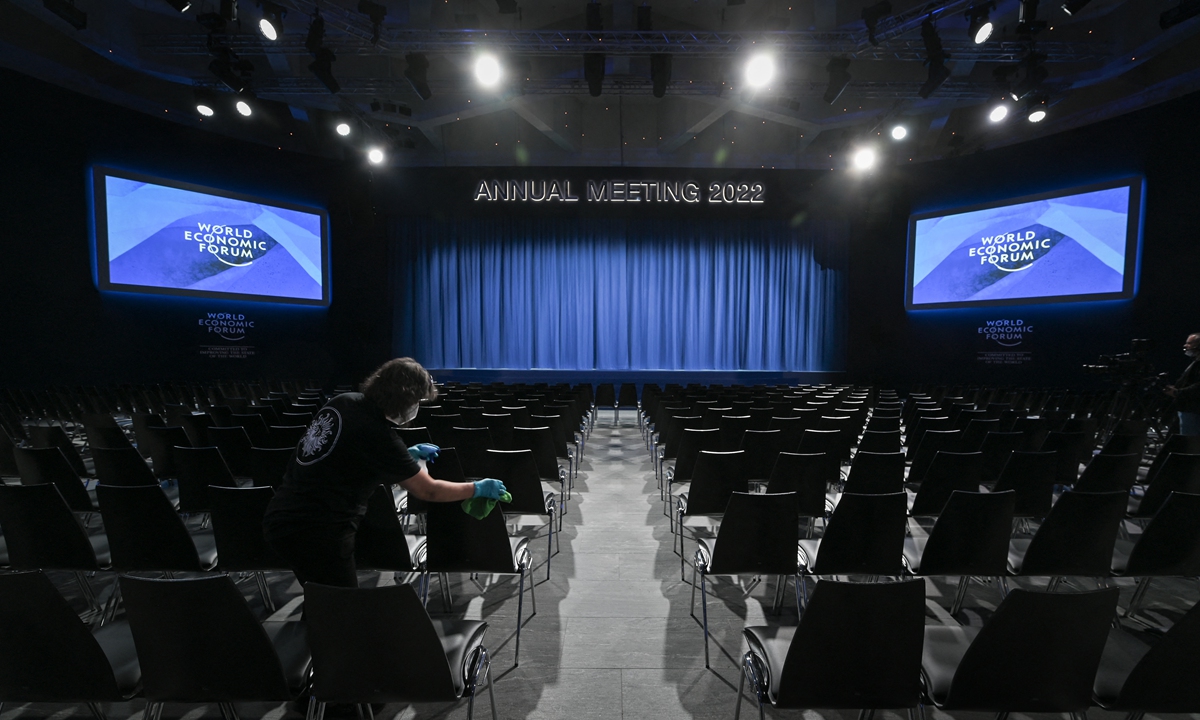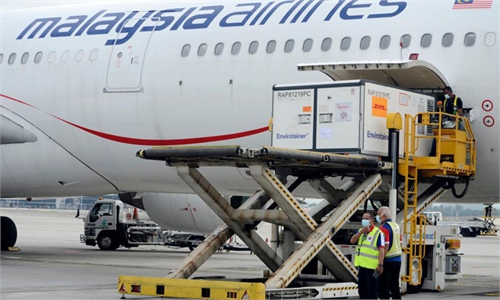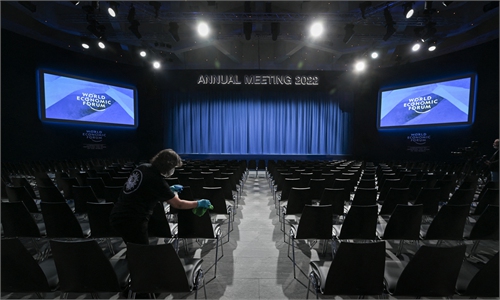
A worker cleans the seats at the congress center ahead of the World Economic Forum (WEF) annual meeting in Davos, which started on May 22, 2022 after a two-year hiatus due to the COVID-19 pandemic. Photo: AFP
Economists and business leaders attending the World Economic Forum (WEF)'s annual meeting on Monday expressed confidence in the long-term outlook for economic growth in China, pinning their hope on the world's second-largest economy to lead a global economic recovery from the COVID-19 pandemic.The WEF 2022 Annual Meeting is being held in Davos, Switzer-land, from Sunday to Thursday. The meeting marks its first in-person session after a two-year hiatus due to the COVID-19 pan-demic. The closely watched gathering of global political, social and business leaders also came as the world economy faces mounting challenges such as rising geopolitical tension, rocketing global in-flation and climate change.
China's active participation in the WEF and its continuous efforts to promote economic globalization and free trade are vital for the world economy to recover in the post-pandemic era, as the world is also seeing a growing trend toward protectionism and unilateralism, analysts said.
China's stable economic growth is of great significance to a global recovery, WEF President Borge Brende told the Xinhua News Agency in a recent interview. "So long- and medium-term, I'm quite bullish on China's economy," said the president.
At a WEF session themed "China's Investment and Economic Out-look" on Monday, speakers also voiced confidence in China, pin-ning their hopes on the economic resilience of the Chinese economy as well as its market size, support for globalization and effective governance.
"I see a lot of things from the resilience of the Chinese economy, and chief among them is 1.4 billion people with hundreds of mil-lions of entrepreneurs… that's 1.4 billion consumers and 1.4 billion potential investors," John Tuttle, vice-chairman and chief commercial officer of the NYSE Group, said during the session.
In addition to China's own economic size, business leaders also agreed that China's approach and commitment to globalization also matter. Chinese leaders have repeatedly reaffirmed commitment to economic globalization and free trade, including during speeches at the WEF.
"Being one of the key players in the global economy and being open to globalization, I think this is a very positive message China has sent to the world," said Jonathan Krane, chief executive officer of KraneShares and a speaker at the forum.
Under its continuous opening-up policies, China has also become a top destination for foreign investment. In 2021, China received record foreign direct investment (FDI) thanks to its growing do-mestic consumption power and expanded market access.
The country's actual use of FDI rose by 14.9 percent year-on-year to reach 1.15 trillion yuan ($172.96 billion), equivalent to a 20.2 percent rise in US dollar terms to $173.48 billion.
Marcos Troyjo, president of the New Development Bank, said China's openness will be steady or rise. Even though China is going from high-speed growth to high-quality growth, the country will remain one of the top two FDI destinations for a long time to come, Troyjo said at the forum.
In the face of the pandemic, China's economic growth faces some short-term challenges, but the government is taking a series of measures such as expanding domestic demand, offering tax cuts to smaller business and cultivating high value-added industries to en-sure economic growth.
China still has an advantage over other major economies in terms of policy reserves, analysts said.
"We have gone through some of these headwinds before. I think the government has been known for being very pragmatic, being very nimble, being very adaptive to deal with the changing envi-ronment," Zhu Ning, deputy dean and professor of finance at Shanghai Advanced Institute of Finance, said at the WEF meeting.
As the world's second-largest economy, China always serves as a ballast for global economic growth, especially as it has contributed to 30 percent of global economic growth for more than a decade, Dong Shaopeng, an expert advisor for the China Securities Regula-tory Commission, told the Global Times on Monday.
"Although the pandemic affected China in an unexpected way, China still contributes significantly to stabilizing the world's eco-nomic development and recovery," Dong said.
The theme of the WEF annual meeting is "History at a Turning Point: Government Policies and Business Strategies." Nearly 2,500 global leaders from business, politics and civil society are expected to take part in the event this week, according to the organizer.
China's Special Envoy for Climate Change Xie Zhenhua will at-tend the forum and meet his US counterpart John Kerry to discuss solutions to cutting global carbon emissions. China's state-owned enterprises, private firms, and technology leaders and scholars will also attend this year's meeting to share their views on China's in-vestment and economic outlook, and China's efforts in the global energy transition.


